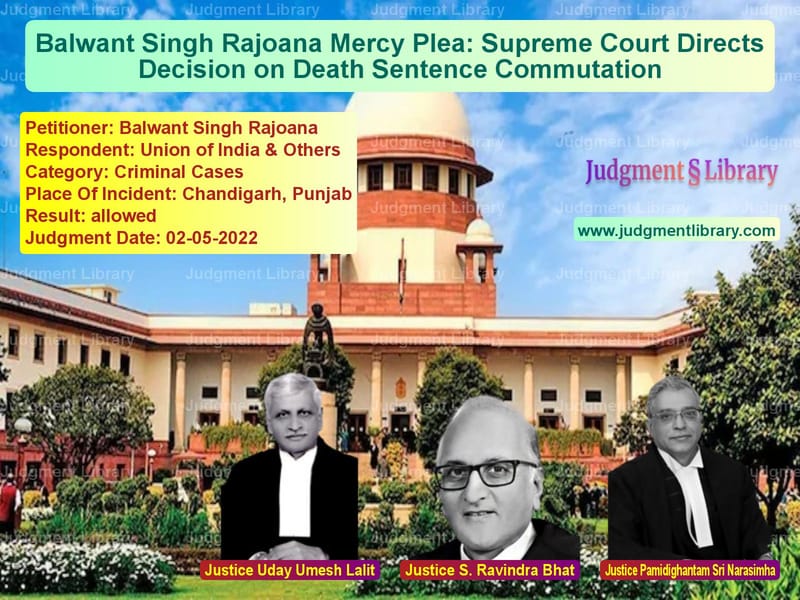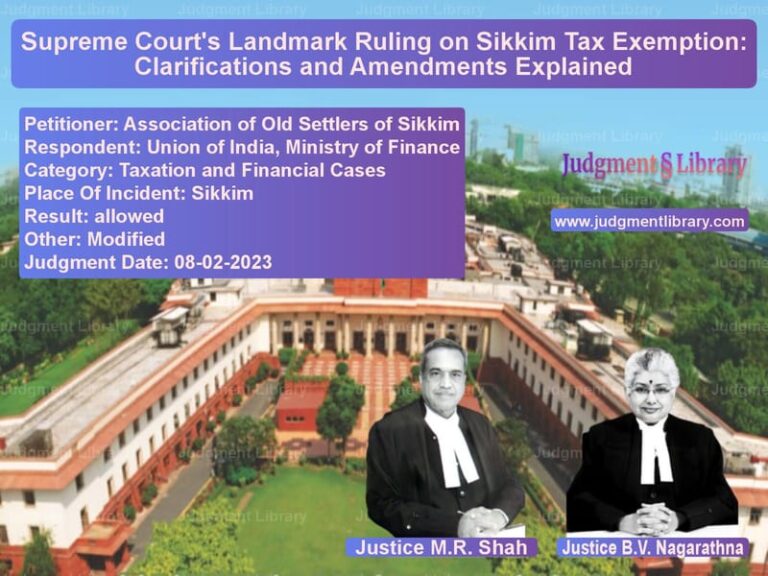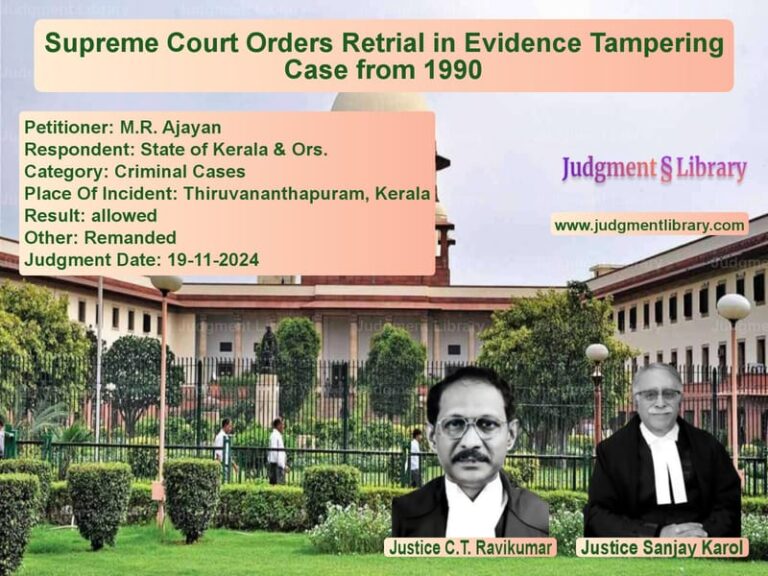Balwant Singh Rajoana Mercy Plea: Supreme Court Directs Decision on Death Sentence Commutation
The case of Balwant Singh vs. Union of India revolves around the pending mercy petition of Balwant Singh Rajoana, who was sentenced to death for the assassination of the former Chief Minister of Punjab, Beant Singh. The Supreme Court directed the government to decide on his mercy plea without delay, despite the pending appeals of his co-accused.
Background of the Case
Balwant Singh Rajoana was convicted for his role in the August 31, 1995 assassination of Punjab Chief Minister Beant Singh. He was sentenced to death by a trial court in 2007. Unlike his co-accused, Jagtar Singh Hawara, who appealed against his conviction, Rajoana did not challenge his sentence. The Punjab and Haryana High Court upheld his death sentence.
Over the years, various Sikh organizations and human rights activists campaigned for clemency, citing his prolonged incarceration and his decision to accept the sentence without appeal. In 2012, a mercy petition was filed on his behalf, and in 2019, the Ministry of Home Affairs (MHA) sought recommendations from the Punjab government regarding the commutation of his sentence as part of the 550th birth anniversary celebrations of Guru Nanak Dev Ji.
Key Legal Issues
- Whether the pendency of co-accused’s appeals affects the consideration of Rajoana’s mercy petition.
- Whether the delay in deciding the mercy petition violates his fundamental rights.
- Whether the government can defer the decision indefinitely due to pending appeals.
Arguments Presented
Petitioner’s Arguments (Balwant Singh Rajoana)
- Rajoana has been in jail for more than 26 years, making his continued incarceration unjust.
- His death sentence was final since he did not file an appeal, and hence, it should not be linked to pending cases of co-accused.
- The delay in considering his mercy plea violates the principles laid down in the Shatrughan Chauhan case regarding prolonged death row imprisonment.
- The MHA had itself initiated the process for his clemency, but no decision had been taken in three years.
Respondents’ Arguments (Union of India & CBI)
- The appeals of co-accused, including Jagtar Singh Hawara, are still pending before the Supreme Court.
- The government must wait for the outcome of the co-accused’s appeals before considering Rajoana’s mercy plea.
- The CBI, which prosecuted the case, maintained that Rajoana’s punishment was based on a legally sound judgment.
- The Home Ministry had recommended that the President defer his mercy plea until all connected legal proceedings were concluded.
Supreme Court’s Observations
The Supreme Court firmly rejected the government’s reasoning for delaying Rajoana’s mercy plea. The key observations included:
- Mercy petitions must be considered independently: The Court clarified that Rajoana’s case must be considered on its own merits and not be delayed due to pending appeals of co-accused.
- Delay in execution of death sentence affects fundamental rights: Prolonged uncertainty regarding a death sentence violates the right to life and dignity.
- The government must act on its own proposal: Since the MHA itself had recommended commutation in 2019, it was bound to take a decision.
- Pending co-accused appeals are irrelevant: The Court ruled that Rajoana’s punishment was decided separately and should not be dependent on other cases.
Key Excerpts from the Judgment
The Supreme Court stated:
“In terms of the direction issued by this Court in its order dated 04.12.2020, the matter be considered by the concerned authorities without being influenced by the fact that the appeal preferred on behalf of the co-accused is still pending consideration before this Court.”
The Court further held:
“The decision on the mercy petition should not be indefinitely postponed based on the pendency of another case, as it violates principles of justice and fair treatment.”
Final Verdict
The Supreme Court issued the following directives:
- The government must take a decision on Rajoana’s mercy petition within two months.
- The pendency of co-accused’s appeals cannot be a reason to defer his clemency request.
- The President’s office must process the mercy plea without further delay.
Outcome: This judgment reinforces the legal principle that delays in deciding mercy petitions for death row convicts are unconstitutional and that each case must be assessed independently.
Petitioner Name: Balwant Singh Rajoana.Respondent Name: Union of India & Others.Judgment By: Justice Uday Umesh Lalit, Justice S. Ravindra Bhat, Justice Pamidighantam Sri Narasimha.Place Of Incident: Chandigarh, Punjab.Judgment Date: 02-05-2022.
Don’t miss out on the full details! Download the complete judgment in PDF format below and gain valuable insights instantly!
Download Judgment: balwant-singh-rajoan-vs-union-of-india-&-oth-supreme-court-of-india-judgment-dated-02-05-2022.pdf
Directly Download Judgment: Directly download this Judgment
See all petitions in Bail and Anticipatory Bail
See all petitions in Custodial Deaths and Police Misconduct
See all petitions in Judgment by Uday Umesh Lalit
See all petitions in Judgment by S Ravindra Bhat
See all petitions in Judgment by P.S. Narasimha
See all petitions in allowed
See all petitions in supreme court of India judgments May 2022
See all petitions in 2022 judgments
See all posts in Criminal Cases Category
See all allowed petitions in Criminal Cases Category
See all Dismissed petitions in Criminal Cases Category
See all partially allowed petitions in Criminal Cases Category







